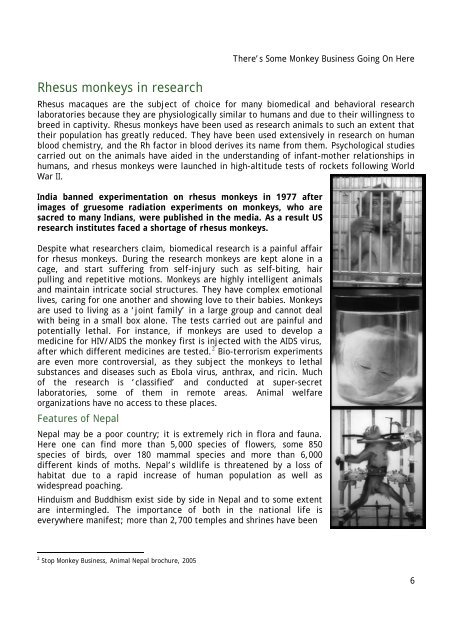Stop Monkey Business Campaign Report - Get a Free Blog
Stop Monkey Business Campaign Report - Get a Free Blog
Stop Monkey Business Campaign Report - Get a Free Blog
You also want an ePaper? Increase the reach of your titles
YUMPU automatically turns print PDFs into web optimized ePapers that Google loves.
Rhesus monkeys in research<br />
There’s Some <strong>Monkey</strong> <strong>Business</strong> Going On Here<br />
Rhesus macaques are the subject of choice for many biomedical and behavioral research<br />
laboratories because they are physiologically similar to humans and due to their willingness to<br />
breed in captivity. Rhesus monkeys have been used as research animals to such an extent that<br />
their population has greatly reduced. They have been used extensively in research on human<br />
blood chemistry, and the Rh factor in blood derives its name from them. Psychological studies<br />
carried out on the animals have aided in the understanding of infant-mother relationships in<br />
humans, and rhesus monkeys were launched in high-altitude tests of rockets following World<br />
War II.<br />
India banned experimentation on rhesus monkeys in 1977 after<br />
images of gruesome radiation experiments on monkeys, who are<br />
sacred to many Indians, were published in the media. As a result US<br />
research institutes faced a shortage of rhesus monkeys.<br />
Despite what researchers claim, biomedical research is a painful affair<br />
for rhesus monkeys. During the research monkeys are kept alone in a<br />
cage, and start suffering from self-injury such as self-biting, hair<br />
pulling and repetitive motions. <strong>Monkey</strong>s are highly intelligent animals<br />
and maintain intricate social structures. They have complex emotional<br />
lives, caring for one another and showing love to their babies. <strong>Monkey</strong>s<br />
are used to living as a ‘joint family’ in a large group and cannot deal<br />
with being in a small box alone. The tests carried out are painful and<br />
potentially lethal. For instance, if monkeys are used to develop a<br />
medicine for HIV/AIDS the monkey first is injected with the AIDS virus,<br />
after which different medicines are tested. 2 Bio-terrorism experiments<br />
are even more controversial, as they subject the monkeys to lethal<br />
substances and diseases such as Ebola virus, anthrax, and ricin. Much<br />
of the research is ‘classified’ and conducted at super-secret<br />
laboratories, some of them in remote areas. Animal welfare<br />
organizations have no access to these places.<br />
Features of Nepal<br />
Nepal may be a poor country; it is extremely rich in flora and fauna.<br />
Here one can find more than 5,000 species of flowers, some 850<br />
species of birds, over 180 mammal species and more than 6,000<br />
different kinds of moths. Nepal’s wildlife is threatened by a loss of<br />
habitat due to a rapid increase of human population as well as<br />
widespread poaching.<br />
Hinduism and Buddhism exist side by side in Nepal and to some extent<br />
are intermingled. The importance of both in the national life is<br />
everywhere manifest; more than 2,700 temples and shrines have been<br />
2 <strong>Stop</strong> <strong>Monkey</strong> <strong>Business</strong>, Animal Nepal brochure, 2005<br />
6


